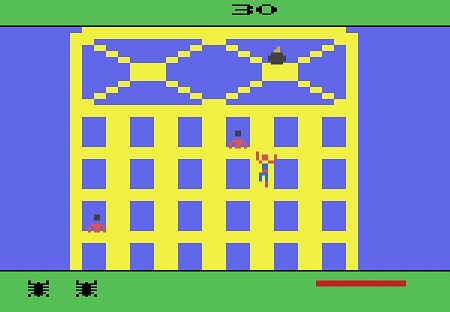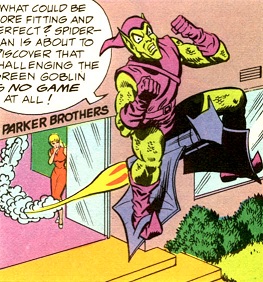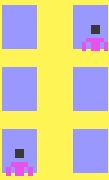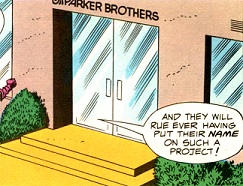
GREEN GOBLIN'S SUPER-BOMB PLOT
Instigator: Green Goblin (Harry Osborn - see comments)
Purpose: To bring the
city to its knees
Allies: The
Gang of Nasties (none identified)
Opposition: CBXTV News (Howard Trefoil, presumably others), J. Jonah Jameson, Parker Brothers, Inc., Joe Robertson, Spider-Man (Peter Parker)
Location: Madison Square Garden, New York City, New York, USA
First Appearance: Spider-Man video game 6-page print ad (1982)
 History:
History:
(Spider-Man video game 6-page
print ad (fb) - BTS) - The toy and game manufacturing firm, Parker
Brothers, Inc. unknowingly glimpsed the video game-like reality of Earth-82171
and created a Spider-Man video game unconsciously based on that
reality, paying Spider-Man royalties from the game due to the use of
his likeness.
(Spider-Man video game 6-page
print ad (fb)) - After escaping from prison, the villainous Green
Goblin was flying through a neighborhood when he heard someone scream
the name "Spider-Man!" At first thinking Spider-Man was already
hounding him, the Green Goblin soon discovered that the yell emanated
from two brothers playing a Spider-Man video game. When one of the
children exclaimed how Spider-Man always beat the Green Goblin, the
Goblin flew into a rage, demanding to know who had humiliated him for
their own petty profit, and he hurled a pumpkin bomb through the
window, destroying the children's television set. The terrified
children recognized the real Green Goblin and they expressed wishes
that the real Spider-Man were there as the Goblin flew off to enact
revenge on whoever created the video game. One of the boys worried what
the insane Goblin might do but the other reminded him that they needed
to worry about how they would explain the blown up TV set to their
mother. Taking some time to research the video game, the Green Goblin
soon learned that the game was created by Parker Brothers, Inc. and he
shortly after flew into Parker Brothers headquarters, where he demanded
the location of the company's president.
Finding the building empty aside
from a secretary, the Green Goblin was told that the president and the
employees had went to a large trade show at Madison Square Garden and
that Spider-Man was there himself to help promote the video game.
Feeling as if Spider-Man being there was only fitting, the Green Goblin
flew off, monologuing that Spider-Man would soon discover that
challenging the Green Goblin was no game at all. Arriving at Madison
Square Garden as Spider-Man was announcing his plans to donate his
royalties from the video game to children's charities, the Green Goblin
accused the sentiment of being pathetic and he hurled a pumpkin bomb at
the wall-crawler.
 (Spider-Man video
game 6-page print ad) - The Green Goblin hurled a second pumpkin bomb
at Spider-Man, hitting a large promotional standee of a clown.
Realizing the trade show crowd thought the attack was a publicity
stunt, Spider-Man took the fight with the Green Goblin to the air and
expressed his wishes that the situation were just a stunt. The Goblin
quickly gained the upper hand by temporarily blinding the hero with
sparkle dust from his glove and ramming him with the corner of his
Goblin Glider. While the crowd continued to marvel at the "publicity
stunt," Spider-Man regained his footing and used his webbing to pull
back a large Spider-Man standee. He then released his grip on the
webbing, causing the standee to slingshot forward and hit the Green
Goblin. Spider-Man then webbed up the Green Goblin and the villain was
carted off by police. A short time later, as the Goblin was led into
his prison cell, the police informed the Green Goblin of their new
recreation facility equipped with their own copy of the Spider-Man
video game. The Green Goblin yelled "Noooo!" in exasperation but one of
the inmates told the Goblin to shut up, as he was winning the video
game.
(Spider-Man video
game 6-page print ad) - The Green Goblin hurled a second pumpkin bomb
at Spider-Man, hitting a large promotional standee of a clown.
Realizing the trade show crowd thought the attack was a publicity
stunt, Spider-Man took the fight with the Green Goblin to the air and
expressed his wishes that the situation were just a stunt. The Goblin
quickly gained the upper hand by temporarily blinding the hero with
sparkle dust from his glove and ramming him with the corner of his
Goblin Glider. While the crowd continued to marvel at the "publicity
stunt," Spider-Man regained his footing and used his webbing to pull
back a large Spider-Man standee. He then released his grip on the
webbing, causing the standee to slingshot forward and hit the Green
Goblin. Spider-Man then webbed up the Green Goblin and the villain was
carted off by police. A short time later, as the Goblin was led into
his prison cell, the police informed the Green Goblin of their new
recreation facility equipped with their own copy of the Spider-Man
video game. The Green Goblin yelled "Noooo!" in exasperation but one of
the inmates told the Goblin to shut up, as he was winning the video
game.
(Spider-Man video game 3-page
print ad (fb) - BTS) - Apparently escaping prison with more knowledge
of the Spider-Man video game, the vengeful Green Goblin plotted to make
New York City see Spider-Man fail by forcing the hero into a complete
recreation of the video game, where the two would play the video game
for the fate of New York City. Inspired by the video game's plot, the
Green Goblin assembled a group of thugs called the Gang of Nasties to
aid against Spider-Man and he devised a Super Bomb that he planned to
go off if Spider-Man lost the video game competition.
(Spider-Man video
game 3-page print ad) - After acquiring two Atari 2600 video game
consoles and two copies of the Spider-Man video games, the Green Goblin
flew to the New York City rooftop of the Reeves Building, where he
gloated to the Gang of Nasties about his impending plot to destroy New
York City with the Super-Bomb. Opting to practice the video game first
so he could beat Spider-Man, the Green Goblin soon wired his Atari 2600
to send an electronic impulse to defuse his Super Bomb should he lose
and Spider-Man's Atari 2600 wired to detonate to Super Bomb should the
wall-crawler lose. He then hid the Super Bomb within New York City
before flying above the Reeves Building, where he left a message in
smoke challenging his nemesis Spider-Man to stop him or risk the
destruction of New York City. J. Jonah Jameson and Joe Robertson
witnessed the smoke message in the sky from the Daily Bugle offices and
Jameson ordered Bugle photographer Peter Parker to get over to Reeves
Building to get photos of Spider-Man when the "web-slinging nut"
arrived on the scene.
Deciding to investigate as
Spider-Man himself, Parker donned his superheroic costume and began
web-swinging towards the Reeves Building. When an explosion destroyed
his webline, Spider-Man began to suspect a set up, as he had been
through a similar scenario while playing his copy of the Spider-Man
Atari video game. Opting to test his suspicions, Spider-Man fired off
another webline, only to witness a member of the Gang of Nasties cut
the webbing, similar to how the crooks in the video game cut the
webbing. Realizing someone was indeed forcing him to act out the event
of the video game, Spider-Man fell onto the Reeves Building's rooftop,
where the Green Goblin revealed his presence and gloated about how he
had trapped the hero in a real-life recreation of the Spider-Man video
game and how they were going to play the video game for the fate of New
York City.
The still-dazed Spider-Man warned
the Green Goblin about destroying New York City, reminding the villain
that the city was filled with innocents and how the villain had
captured Spider-Man. Insisting that it wasn't Spider-Man himself he
wanted, the Green Goblin announced his wishes for the people to see
Spider-Man fail and die knowing that it was Spider-Man's fault. As
CBXTV news reporter Howard Trefoil flew over the scene in a news
copter, the Green Goblin revealed to Spider-Man how the Atari 2600
systems they would be playing on were wired to detonate his hidden
Super Bomb should the Goblin lose. The Green Goblin then proclaimed the
competition begun and the two began playing the video game as CBXTV
televised the competition.
(Spider-Man video
game 2-page print ad) - As Spider-Man took his turn playing the video
game, the Green Goblin taunted Spider-Man, reminding the hero that he
would blow up New York City if Spider-Man couldn't play the video game
fast enough. While Spider-Man continued to focus on the video game, the
Goblin gloated that if he didn't beat Spider-Man, his Gang of Nasties
would and that Spider-Man was running out of web fluid, prompting
Spider-Man to think to himself if the situation was more action than he
could handle.
(Spider-Man video game 3-page print ad) - Spider-Man
quickly gained the upper hand and he soon won the game, the Goblin's
loss defusing the Super Bomb. Seconds after the Goblin's defeat, the
Green Goblin was apprehended by police and when the police asked
Spider-Man for a comment, the web-swinging hero claimed that he often
played the Spider-Man video game to keep his reaction time in shape
during bad weather. Thinking Spider-Man was being a smart aleck, the
police thanked Spider-Man for "nuthin'" and Spider-Man swung away,
wondering to himself if the police officer would've preferred the truth
-- that he simply played the video game for some excitement in his dual
identity of Peter Parker -- though Spider-Man thought perhaps that
statement would've sounded too much like an ad for the game.
Comments: Created by David Anthony Kraft and John Romita, Sr.
Originally, this profile incorporated elements of the real-life Spider-Man Atari 2600 video game into the profile but after the Atari Green Goblin had a cameo in the 2023 Spider-Man: Across the Spider-Verse
film and the Atari 2600 video game was designated as Earth-82171, I had
prepared to update this profile to make the events occur on
Earth-82171. However, while researching deeper into the video game for
the updates, I discovered several more print ads existed than I
originally knew of when I originally wrote this profile. The additional
print ads made it clear that the Atari 2600 video game was a video game
within the fictional Marvel Universe. Since the video game had already
been designated Earth-82171, I made the determination that Earth-82171
is not just the reality seen in the real-life Atari 2600 reality but
also the one seen in the fictional Earth-616 of the Marvel Universe. To
break it down more easily, all of the print ads promoting the video
game are Earth-616 and the video game itself (as well as its box art
& instruction manual) are Earth-82171. This profile has been
updated to reflect this as of 4/7/2025 and the pertinent info relating
only to the game itself has been moved to a new profile on Earth-82171.
Given the year the Spider-Man video game was made
(1982), the Green
Goblin seen in the game's print ads could only be Harry Osborn, although I suppose
it's possible that the game's story was an untold tale from the past
and it's Norman...
Green Goblin's Gang of Nasties
were identified in the 2-page comic book advertisement for the video
game. Also, while this profile originally thought the city in the video
game was left unidentified, the additional print ads I've only recently learned of clearly identifies the city as New York
City.
Speaking of additional print ads,
the 6-page print ad where the Green Goblin attacks the trade show is
listed online as nothing more than a print ad. However, 6 pages seems
like quite large for a print ad. I can't help but speculate whether or
not that 6-page "print ad" was actually some sort of promotional comic
book given out at an actual trade show where the Spider-Man video game
was presented. After all, the "ad" reads like an actual 6-page comic
book, it takes place IN a trade show and it even has comic credits for
the writer and artwork! I'm curious and if it WAS published at an
actual comic book, I'd love to find a copy!
I'm sure Parker Brothers is at the
very least mentioned in other Marvel Comics, especially given Marvel's
partnerhip with Parker Brothers on the Rom comic. Do you know of any
other Marvel comic books that mention or show Parker Brothers, Inc.?
Let me know so I can add them to the subprofile here!
Profile by Proto-Man.
CLARIFICATIONS:
Green Goblin's Super Bomb Plot has no known connections
to
- any other Green Goblin
plot
CBXTV News
CBXTV News was the television news company that
reported on the Green Goblin's plot and televised the video game
competition between the Green Goblin and Spider-Man.
--Spider-Man video game 3-page print ad - BTS
 The Gang
of Nasties
The Gang
of Nasties
The Gang of Nasties were a group of criminal thugs
working under the Green Goblin. While preparing his plot against
Spider-Man, the Green Goblin gloated to the Gang of Nasties and a short
time later, after challenging Spider-Man, the Green Goblin sent the
Gang of Nasties after the wall-crawler and one of them managed to cut
Spider-Man's webline, causing the hero to fall right into the Goblin's
clutches atop the Reeves Building.
--Spider-Man video game 3-page print ad (2-page print ad - BTS,
 Parker Brothers, Inc.
Parker Brothers, Inc.
Parker Brothers, Inc. was a firm that specialized in
manufacturing toys and games. At some point, the company created a
video game based on Spider-Man and shortly after releasing it, most of
the company attended a trade show at Madison Square Garden with
Spider-Man in attendance to help promote the video game. Upon escaping
prison and learning of the video game's existence, the criminal Green
Goblin became furious that he was being humiliated by the video game
and, after learning Parker Brothers had created it, the Goblin attacked
Parker Brothers, Inc. seeking the company's president. Learning that
most of the company was a trade show at Madison Square Garden, the
Green Goblin flew off to Madison Square Garden, where he attacked
Spider-Man, who was there to help Parker Brothers promote the
Spider-Man video game. Most of the crowd assumed the fight between the
two superhumans to be nothing more than a publicity stunt by Parker
Brothers using hired actors.
Of course, Parker
Brothers, Inc. was a real-life toy manufacturing company. It was
founded in 1883 and it became famous for the board games Monopoly,
Clue, Sorry!, Risk, Trivial Pursuit, Ouija, Aggravation and Bop It,
among many, many others. In 1968, the company branched out into the
production of foam-like toys under the Nerf banner and (important to
Marvel) the Rom action figures in 1979. The company was bought by the
Hasbro toy company in 1991, who merged it with the also-acquired Milton
Bradley toy company as Hasbro Games. Parker Brothers remained a
subsidary of Hasbro Games until the Parker Brothers name was retired in
2009 in favor of using the overall Hasbro brand name.
--Spider-Man video game 6-page print ad
Howard Trefoil
Howard Trefoil was a reporter for CBXTV News. After
the Green Goblin held New York City hostage under threat of a Super
Bomb and forced Spider-Man to compete in a video game challenge for the
fate of the city, Trefoil reported on the events from the CBXTV News
copter and the footage acquired from the news copter was broadcasted
over CBXTV.
--Spider-Man video game 3-page print ad - BTS
images: (without ads)
Spider-Man video game 1-page print ad, splash page (Green Goblin's Super Bomb Plot, main image)
Spider-Man video game 2-page print ad, p1, pan1 (Green Goblin gloating to Spider-Man)
Spider-Man video game 6-page print ad, p3, pan5 (angry Green Goblin leaving Parker Brothers, Inc.)
Spider-Man video
game 3-page print ad, p1, pan2 (Gang of Nasties)
Spider-Man video game 6-page print ad, p3, pan1 (Parker Brothers, Inc.)
Appearances:
Spider-Man video game 6-page print ad (1982) - David Anthony Kraft (writer), John Romita, Sr. (art), uncredited editor
Spider-Man video game 1-page print ad (1982) - uncredited creative team
Spider-Man video game 2-page print ad (1982) - uncredited creative team
Spider-Man video game 3-page print ad (1982) - uncredited creative team
First Posted: 07/15/2016
Last updated: 04/07/2025
Any Additions/Corrections? please let
me know.
Non-Marvel Copyright info
All other characters mentioned or pictured are ™ and
© 1941-2099 Marvel Characters, Inc. All Rights Reserved.
If you like this stuff, you should check out the real thing!
Please visit The Marvel Official Site at: http://www.marvel.com
Special Thanks to www.g-mart.com
for hosting the Appendix, Master List, etc.!
Back to Events
 History:
History:
 (
(
